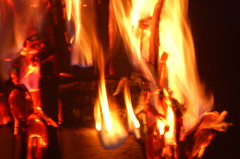Race for the White House
For a while I have been thinking that I would post translations of my monthly article "Fresh Air" that appears in Fujiyoshida's monthly magazine "Koho" on my blog, but out of 18 total articles, this one, my 19th, will be the first. I hope to continue every month. The audience of the Koho and "Fresh Air" are the citizens of Fujiyoshida City. Here is Fresh Air for the February Koho (translated from Japanese).
"Race for the White House"
2008 should be an important year for America and the world. Since 1952, there hasn't been a presidential election without an incumbent president or vice president runing. Both the democrats and republicans must elect candidates for the presidency within their party, which hasn't happened in 56 years, and Americans are more and more concerned with their political party's method of choosing candidates.
Average Americans like myself want to have a say in who their political party choses to be candidate for the president, but chosing the candidate is the role of the National Convention. This is the first time I had to research on how political parties chose their candidate:
The Republican (GOP) National Convention will take place in Minneapolis, MN on September 1-4th. The Democratic National Convention is to be held in Denver, CO on August 25th-28th, but only delegates are allowed to attend the conventions, so how in the world can my voice have an impact in my party's national convention?
Depending on the state and political party to which one is registered, there are two methods of voting for nominees for one's party's presidential candidate; the caucus and the primary election. The caucus starts at the county level where in order to chose delegates, one actually shows up to an appointed meeting place, consults with other party members, and votes for their delegate of choice. On the other hand, a primary election takes place at the state level, but instead of voting for delegates, one votes directly for a party presidential candidate, and based on votes, delegates are alloted to nominees. The level of democracy of the caucus and primary are heavily debated. Because many have work and school, for example, many voters are unable to attend a party's caucus, so arguments for primary elections focus on its ability to inculde a wide spread portion of the population; basically anyone able to send in a ballot; including the elderly and disabled. However, unlike a caucus, primary elections are criticized for having too little value for the community because one need not really think and discuss the issues or candidates in depth; one can vote in a primary without much effort to connect to one's community. Currently, methods of electing delegates differ between state and political party. Some states and parties chose to allocate delegates based on 100% of either caucus or primary results, and some decide based on a combination of both. My current voter registration location and party uses only the caucus, so in order to have a say in which candidate my party elects, I would have to actually travel back to America and participate in person in the caucus (absentee caucus is only available for military personell overseas). Really making democracy work is not an easy task.
Though both parties' national conventions will be held in August and September, we will probably be aware of the two most likely presidencial candidates by May 2008; foregoing an upset. Finally, on November 4th 2008, America will elect a new president.
"Race for the White House"
2008 should be an important year for America and the world. Since 1952, there hasn't been a presidential election without an incumbent president or vice president runing. Both the democrats and republicans must elect candidates for the presidency within their party, which hasn't happened in 56 years, and Americans are more and more concerned with their political party's method of choosing candidates.
Average Americans like myself want to have a say in who their political party choses to be candidate for the president, but chosing the candidate is the role of the National Convention. This is the first time I had to research on how political parties chose their candidate:
The Republican (GOP) National Convention will take place in Minneapolis, MN on September 1-4th. The Democratic National Convention is to be held in Denver, CO on August 25th-28th, but only delegates are allowed to attend the conventions, so how in the world can my voice have an impact in my party's national convention?
Depending on the state and political party to which one is registered, there are two methods of voting for nominees for one's party's presidential candidate; the caucus and the primary election. The caucus starts at the county level where in order to chose delegates, one actually shows up to an appointed meeting place, consults with other party members, and votes for their delegate of choice. On the other hand, a primary election takes place at the state level, but instead of voting for delegates, one votes directly for a party presidential candidate, and based on votes, delegates are alloted to nominees. The level of democracy of the caucus and primary are heavily debated. Because many have work and school, for example, many voters are unable to attend a party's caucus, so arguments for primary elections focus on its ability to inculde a wide spread portion of the population; basically anyone able to send in a ballot; including the elderly and disabled. However, unlike a caucus, primary elections are criticized for having too little value for the community because one need not really think and discuss the issues or candidates in depth; one can vote in a primary without much effort to connect to one's community. Currently, methods of electing delegates differ between state and political party. Some states and parties chose to allocate delegates based on 100% of either caucus or primary results, and some decide based on a combination of both. My current voter registration location and party uses only the caucus, so in order to have a say in which candidate my party elects, I would have to actually travel back to America and participate in person in the caucus (absentee caucus is only available for military personell overseas). Really making democracy work is not an easy task.
Though both parties' national conventions will be held in August and September, we will probably be aware of the two most likely presidencial candidates by May 2008; foregoing an upset. Finally, on November 4th 2008, America will elect a new president.





